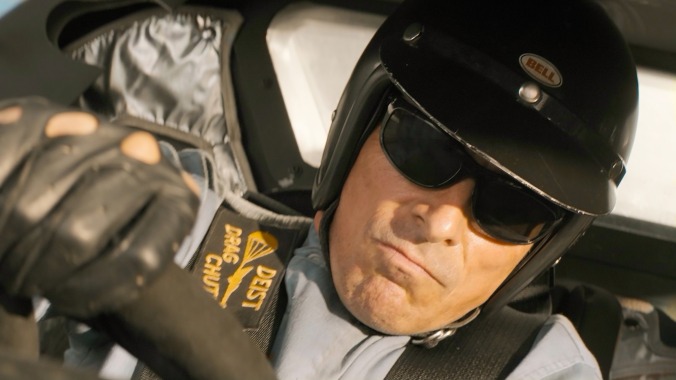Matt Damon and Christian Bale win one for the dads in the entertaining Ford V Ferrari

James Mangold began his directing career with a small-scale independent film; though he now operates entirely within the Hollywood system, he’s remarkably managed to keep making the kind of movies for adults the studios have otherwise abandoned. His new film, Ford V Ferrari, feels like some kind of last stand for grown-up middlebrow cinema. In the past, Mangold has made a fanciful romantic comedy, a cop thriller, a straight-shooting western, a musical biopic, even a couple of X-Men pictures that felt more indebted to old Hollywood genres than comic-book formulas. (In the superhero realm, that’s practically a revelation.) Now he’s directed a star-studded 150-minute period drama about racecars and the men who design them. Setting aside more particular genre trappings, Mangold re-engineers one of his unfussy studio throwbacks into a supersized Dad Movie event. Appropriately, it was greenlit by 20th Century Fox before the studio was absorbed into the Disney empire earlier this year.
More appropriate still that this Fox production and Disney release is a lengthy tussle between two big corporations: the massive Ford Motor Company and the more specialized luxury car company Ferrari. The film opens in the mid-’60s, with Henry Ford II (Tracy Letts), eldest grandson of the original Ford, angrily and somewhat impotently admonishing his workers to come up with new ideas. When Enzo Ferrari (Remo Girone) balks at Ford’s attempt to buy out the smaller company, Ford becomes further incensed, and vows to beat Ferrari at France’s 24 Hours Of Le Mans, an endurance racing event. Undeterred by Ferrari’s sterling record at this race (or much knowledge of racing in general), Ford hires designer and former racer Carroll Shelby (Matt Damon) to make a better, faster car. Shelby in turn insists on the participation of volatile driver Ken Miles (Christian Bale), setting the stage for much corporate interference, as well as a looming deadline and tryout races on the road to Le Mans.
“He’s difficult, but good,” one character helpfully explains about Miles, in case the audience doesn’t understand how stock movie conflicts work. But Bale doesn’t emphasize Ken’s insufferable genius side, even if he’s introduced in a scene that begins with him slagging off a car inspector and ends with him chucking a wrench at Shelby. The movie quickly establishes that he loves his wife Mollie (Caitriona Balfe) and their son Peter (Noah Jupe), and even if these characters are mostly accessories to Ken’s headstrong abilities as both a speed demon and a studier of speed, Bale underplays his hotshot status. This is the star’s most purely charming role in years, with notes of his work in The Big Short and, however briefly, The Fighter. He makes it clear that while Ken can be disagreeable, he comes about it honestly. A corporate drone describes him as resembling a beatnik; he looks more like a dad on his day off, favoring sweatshirts, pajama pants, and a slight stoop to his posture, as if a lifetime of contorting himself in and around cars has changed him down to the bones.
As usual, Damon takes the less showy part, but Ford V Ferrari gives its leads plenty to do as they feud with each other and various Ford higher-ups. This is a movie that understands the old-fashioned joy of thwarting a meddling Josh Lucas (he plays Leo Beebe, alongside Jon Bernthal as Lee Iacocca). The racing scenes are dynamically shot, as Mangold captures plenty of action through close-ups of Bale, inside those zooming cars, and Damon, watching from the sidelines, his frustration over pivoting from pro driving to engineering rarely spoken aloud but often lurking behind his eyes. Racing turns out to be the perfect quasi-sport for a director who loves filming his actors’ faces almost as much as he loves decorating them with sunglasses and magic-hour lighting that makes everyone look pleasantly ruddy. It feels like at least a third of his close-ups seem to feature the donning or doffing of shades.
Given the story it’s telling, Ford V Ferrari is a little meandering, as if Mangold is determined to out-bloat overlong superhero blockbusters with real people and real cars and real sets, dammit. But the elongated running time allows for some quiet moments that give his movie heft, even if its freedom from CG has become grossly exaggerated on the press tour. (Digital effects were used on certain shots, albeit more subtly than usual.) The central conflict needs that time, too, to accelerate into something worth caring about. For a large chunk of the movie, it’s hard to avoid the fact that the scrappy underdogs are working for the glory of the biggest car company in the world, which is operating almost entirely out of executive spite. (The title is misleading, in the sense that Ferrari appears only on the periphery; most of the film is the more internal Ford V Freelancers.) But Bale and Damon’s investment pays off; eventually, an emotional through-line emerges. Ford V Ferrari isn’t quite as witty or elegiac as it could be, but it does have a pragmatist’s sense of satisfaction in doing meaningful, enjoyable work while maneuvering around the limitations of an unfeeling corporate world. From within the confines of the resettling studio system, this might be Mangold’s most personal film yet.